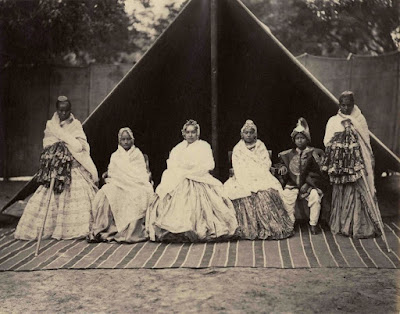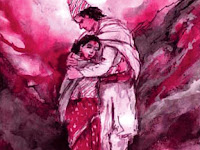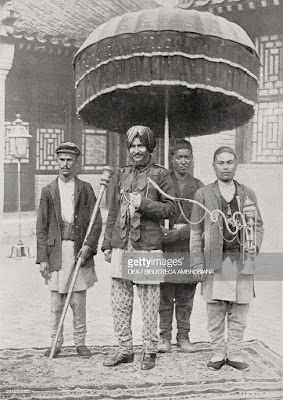“Lhasa ma soon chha, kaan mero buch-chai”, teased Putali Maharani whenever she had the chance. Prime Minister Jung Bahadur Rana had come out victorious against the Tibetans and abrogated the unfair Treaty of Betrawati signed under duress by the Nepalese under Regent Bahadur Shah as the Chinese army had come to aid the Tibetans and pushed the Gorkhalis all the way from Kerung down along the Trishuli River to Nuwakot. Now Nepal could pursue trade with the Tibetans unhindered and the Chinese monopoly on the lucrative gold trade was broken. Putali Maharani wanted a piece of action of the gold and silver trade for her own clan and was frequently goading her husband to send her sisters to Lhasa on a trade mission to establish a company. She was referring to an old adage made famous in Nepal that women folks often chimed with petulant discontent, “There is gold in Lhasa but my ears are unadorned”.
 |
| Putali Maharani with family, Babar Jung her son. Picture by Samuel Bourne |
Putali was one of Jung’s favorite wives and Jung owed a lot to her. As a palace maid Putalibai in the service of the Junior Queen Rajya Luxmi Devi, she had reported to Jung the goings in the royal household, the competition of the two queens to gain an upper hand, the shenanigans of the feeble minded king, the plots and counter-plots. Jung knew that to survive and thrive under these circumstances, he needed to know which way the wind was blowing constantly so that he would himself not be blown off course. Putali was a clever plant in the royal household, a spy, and a lover. Putali was a Newar girl, a daughter of the Dangol gardener of Jung Bahadur’s Thapathali Durbar, a maternal inheritance from the Thapa clan. She was very loyal to Jung.
 |
| “Muna Madan” book cover |
Putali was familiar with the Newa bhasa balad made famous later in Nepali by the great poet Laxmi Prasad Devkota titled “Muna Madan”. Madan the protagonist leaves for Lhasa to reap rich reward in trade and leaves behind a very young bride Muna in Kathmandu. Madan undergoes much hardship but returns with a potful of gold but gets sick en-route and his friends leave him for dead. The friends reach Kathmandu and report to the bride Muna that her husband died on the way back. Madan is saved however by a good-hearted low caste man and brought back to Kathmandu in good health only to find that his Muna has died of grief. Putali always teared up whenever the play was put on by artists at the Thapathali Durbar.
Newar traders had established a history of trading with Tibet since times immemorial. In fact this history certainly goes at least as far back as to the 7th Century Licchavi period when Nepalese Princess Bhrikuti, daughter of King Amsuvarman, was given in marriage to Tibetan king Srong-Tsen-Gampo. Sadly all this was temporarily halted and China took over the gold trade after the disastrous war of Regent Bahadur Shah. Instead of exerting more authority the expanding Gorkha kingdom had come under an existential threat. Prime Minister Jung Bahadur had now overturned the terms of the unfair treaty and with the Treaty of Thapathali signed in 1856 A.D. gained for Nepal an annual tribute of ten thousand Rupees, customs free trade facility for Nepalese traders with the right to trade in jewellery, ornaments, grains and clothes, and with the Tibetans agreeing to receive a permanent Nepalese Residency in Lhasa to monitor the welfare of the Nepalese community there.
 |
| Young beauty Putali |
Putali had the good fortune of being one of Jung Bahadur’s wives and she had already given birth to a son Babar Jung. She was comfortably ensconced in a wing of Thapathali Durbar overlooking the beautiful Putali Bagaincha, the Butterfly Garden. However her Dongol clan was still mired in poverty and she implored Jung Bahadur to send her sisters and their families on trade missions to Lhasa to reap the benefit of the new circumstances now prevailing there. The traditional Newar trading houses of the Dhakhwa, Sakya and Tuladhar families were again free to trade without legal impediment or security risk and Putali wanted her Dongol clan to join in this opportunity.
As we can see this did happen and her family members including her two sisters took this opening and proceeded to Lhasa to set up trading houses and participate in the marts that was periodically organized. The family lived there and as history unfolded we can see one of Putali’s nephew Bhairab Bahadur acquiring a station of high rank as the China and Tibet expert in the Munsi Khana or Foreign Office. He was sent by Maharajah Chandra Shumsher Jung Bahadur Rana on Nepal’s last quinquennial mission to China in 1908. The Shumsher clan was eternally grateful to Putali as she adopted the motherless Bir Shumsher and raised him together with her own son Babar Jung. As a Newar girl ‘married’ at pre-adolescence to the bel-fruit, a species of wild apple, in the traditional Bel-Bibaha, Putali was never going to be a widow and there was no need for her to commit Sati upon the sudden death of Maharajah Jung Bahadur Rana. She was not a part of Jung’s final hunting retinue as she was mourning the untimely death of her son Babar Jung from consumption only a few months earlier. She became the revered golden widow of Maharajah Jung Bahadur Rana until her death.
 |
| Chir Kazi Bhairab Bahadur Dangol in China, 1908 A.D. |


